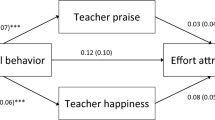Abstract
This investigation assessed the hypothesis that girls are more likely to be learned helpless in math than boys. Students in grades 5 through 11 completed questionnaires assessing their causal attributions for success and failure in mathematics, their self-concepts of math ability, and their expectations for both current and future success in math. Results indicated that sex differences in attributions depended on the type of methodology used (open-ended or rank-ordered questions). The most consistent difference involved the differential use and ranking of ability, skills, and consistent effort. No sex differences were found in either students' perceptions of their own math ability or in their current achievement expectations. Girls, however, rated their future expectations slightly lower than did boys. Taken together, these results provide little support for the hypothesis that girls are generally more learned helpless in mathematics than are boys.
Similar content being viewed by others
References
Abramson, L. Y., Seligman, E. P., & Teasdale, J. D. Learned helplessness in humans: Critique and reformulation. Journal of Abnormal Psychology, 1978, 87, 49–74.
Bar-Tal, D. Attributional analysis of achievement-related behavior. Review of Educational Research, 1978, 48, 259–271.
Bar-Tal, D., & Darom, E. Pupils' attributions for success and failure. Child Development, 1979, 50, 264–267.
Brush, L. R. Encouraging girls in mathematics: The problem and the solution. Cambridge, Mass.: Abt Books, 1980.
Crandall, V. C., Katkovsky, W., & Crandall, V. J. Children's belief in their own control of reinforcement in intellectual-academic achievement situations. Child Development, 1956, 36, 91–109.
Deaux, K. Sex: A perspective on the attribution process. In J. H. Ickes, & R. F. Kidd (Eds.), New directions in attribution research (Vol. 1). Hillsdale, N.J.: Lawrence Erlbaum, 1976.
Diener, C. I., & Dweck, C. S. An analysis of learned helplessness: Continuous change in performance, strategy, and achievement cognitions following failure. Journal of Personality and Social Psychology, 1978, 36, 451–462.
Dweck, C. S. The role of expectations and attributions in the alleviation of learned helplessness. Journal of Personality and Social Psychology, 1975, 31, 674–685.
Dweck, C. S., & Bush, E. Sex differences in learned helplessness: 1. Differential debilitation with peer and adult evaluations. Developmental Psychology, 1976, 12, 147–156.
Dweck, C. S., & Goetz, T. E. Attributions and learned helplessness. In J. H. Harvey, W. J. Ickes, & R. F. Kidd (Eds.), New directions in attribution research (Vol. 2), Hillsdale, N.J.: Lawrence Erlbaum, 1978.
Dweck, C. S., & Licht, B. G. Learned helplessness and intellectual achievement. In J. Garber & M. E. P. Seligman (Eds.), Human helplessness: Theory and application. New York: Academic Press, 1980.
Dweck, C. S., & Reppucci, N. D. Learned helplessness and reinforcement responsibility in children. Journal of Personality and Social Psychology, 1973, 25, 109–116.
Elig, T. W., & Frieze, I. H. A multidimensional scheme for coding and interpreting perceived causality for success and failure events: The Coding Scheme of Perceived Causality (CSPC). JSAS Catalog of Selected Documents in Psychology, 1975, 5, 313. (Ms. No. 1069)
Elig, T. W., & Frieze, I. H. Measuring causal attributions for success and failure. Journal of Personality and Social Psychology, 1979, 37, 621–634.
Fennema, E., & Sherman, J. Sex-related differences in mathematics achievement, spatial visualization and affective factors. American Educational Research Journal, 1977, 14, 51–71.
Fennema, E., & Sherman, J. Sex-related differences in mathematics achievement and related factors: A further study. Journal for Research in Mathematics Education, 1978, 9, 189–203.
Fox, L. H., Brody, L., & Tobin, D. (Eds.) Women and the mathematical mystique. Baltimore: Johns Hopkins University Press, 1980.
Frieze, I. H., Fisher, J., Hanusa, B., McHugh, M., & Valle, V. Attributing the causes of success and failure: Internal and external barriers to achievement in women. In J. Sherman & F. Denmark (Eds.), Psychology of women: Future directions of research. New York: Psychological Dimensions, 1978.
Frieze, I. H., & Snyder, H. N. Children's beliefs about the causes of success and failure in school settings. Journal of Educational Psychology, 1980, 72, 186–196.
Klein, D. C., Fencil-Morse, E., & Seligman, M. E. P. Learned helplessness, depression, and the attribution of failure. Journal of Personality and Social Psychology, 1976, 33, 11–26.
Parsons, J. E., Adler, T. F., Futterman, R., Goff, S. B., Kaczala, C. M., Meece, J. L., & Midgley, C. Expectancies, values and academic behaviors. In J. T. Spence (Ed.), Perspectives on achievement and achievement motivation. San Francisco: Freeman, in press.
Parsons, J. E., Ruble, D. N., Hodges, D. L., & Small, A. W. Cognitive-developmental factors in emerging sex differences in achievement-related expectancies. Journal of Social Issues, 1976, 32, 47–61.
Rholes, W. S., Blackwell, J., Jordan, C., & Walters, C. A developmental study of learned helplessness. Developmental Psychology, 1980, 16, 616–624.
Seligman, M. E. P. Helplessness: Depression, development, and death. San Francisco: Freeman, 1975.
Sherman, J. Mathematics, spatial visualization, and related factors: Changes in girls and boys, grades 8–11. Journal of Educational Psychology, 1980, 72, 476–482.
Siegel, S. Nonparametric statistics for the behavioral sciences. New York: McGraw-Hill, 1956.
Stein, A. H., & Smithells, T. Age and sex differences in children's sex role standards about achievement. Developmental psychology, 1969, 1, 252–259.
Tennen, H., & Eller, S. J. Attributional components of learned helplessness and facilitation. Journal of Personality and Social Psychology, 1977, 35, 265–271.
Weisz, J. R. Perceived control and learned helplessness among mentally retarded and non-retarded children: A developmental analysis. Developmental Psychology, 1979, 15, 311–319.
Wittig, M. A., & Petersen, A. C. (Eds.). Sex-related differences in cognitive functioning: Developmental issues. New York: Academic Press, 1979.
Wolleat, P. L., Pedro, J. D., Becker, A. D., & Fennema, E. Sex differences in high school students' causal attributions of performance in mathematics. Journal of Research in Mathematical Education, 1980, 11, 356–366.
Author information
Authors and Affiliations
Rights and permissions
About this article
Cite this article
Parsons, J.E., Meece, J.L., Adler, T.F. et al. Sex differences in attributions and learned helplessness. Sex Roles 8, 421–432 (1982). https://doi.org/10.1007/BF00287281
Issue Date:
DOI: https://doi.org/10.1007/BF00287281




